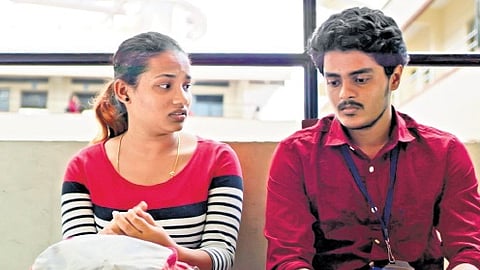

BENGALURU : It’s a familiar story that has played out in real life innumerable times since the inception of the digital age. The lives of two teenage lovers are turned upside down following a leaked intimate video. But how the film Hadinelentu takes that premise to explore complex issues of caste bias, teen sexuality, and socio-economic disparities, has garnered it accolades from some of the most prestigious film festivals across the world.
More than 12 months since it premiered at the 2022 Busan Film Festival, the Kannada-language film, written and directed by city-based filmmaker Prithvi Konanur, is now gearing up for a theatrical release across Karnataka. The film tells the story of Deepa, played by Sherlyn Bhosale, who comes from a Dalit working-class family, and Hari, portrayed by Neeraj Mathew, from a privileged Brahmin family as it highlights the stark contrasts in the experiences of the teenagers as they navigate the aftermath of the incident.
“While that incident is the initial premise, it’s not central to the film. Rather, the film takes a direction that people have rarely seen,” says Konanur, adding, “I didn’t want to do a straightforward drama, but also make the legal intricacies and police procedures surrounding the incident central to the story. I would say that it leans more toward a thriller than a drama. It’s a story that is real and something that is rooted in our society. Yet it has an intriguing plot with all these twists and turns.”
While the film has received some criticism towards its production values and technical flaws, it has largely received positive feedback for its emphasis on realism. Featuring natural dialogues and a minimal background score, Hadinelentu relies heavily on the strength of the story and performances. “The idea has been with me for years, and it took a lot of effort and research to flesh out the characters and make the script as realistic as possible,” shares Konanur, adding, “There are no black and white characters in real life. I was inspired by Girish Kasaravalli’s films. Some of his characters are intelligently written – they have clearly defined motivations, and even when the motivations are suspect, it is clearly expressed. That’s something I wanted to emulate.”
Meanwhile, a significant element of Hadinelentu is its exploration of caste. But, according to Konanur, the film takes an unconventional approach to the subject. “Caste is an integral part of this film. The script is inspired by some real things that have happened. However, the exploration of caste here is quite different. It’s not about the oppression or discrimination that people go through in their daily lives. It’s rather trying to look at the way people question and perceive caste.
I believe most people in this country don’t really understand caste well. We talk about it with a broad scope, we paint a picture of what it is. But often, the ground reality is much more complex,” he says, adding that his journey from being in a sheltered environment in the IT sector to filmmaking has been a revelation in understanding the pervasiveness of caste in Indian society. “When I was working in the IT sector, I was quite insulated from the effects of caste.
There, you only see meritocracy. But when I stepped away from that world, I realised how embedded caste still is in society, at the grassroot level. For a lot of people, caste is still important, because it creates all these power dynamics in their lives, which is rarely explored by mainstream cinema.”